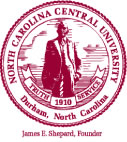My interest in mathematics began while I was in elementary school. During that time and throughout the rest of my academic career, I excelled in mathematics and was placed in upper level math courses. For a while, my love for mathematics was the result of it being an easy discipline for me, but as time went on, it was the critical thinking and logical reasoning that attracted my interest.
I have completed my first year at North Carolina Central University (NCCU) as a mathematics major. Expecting it to be a very challenging year, I was not disappointed. During the course of the year, I had the opportunity to take Calculus I and II, which are required for my major. This upcoming year, I will be taking more courses for my major such as Calculus III, logic, statistics, and differential equations.
All freshmen at NCCU are required to interview someone who works in their potential profession for a class assignment. I decided to interview my Calculus I teacher since I want to eventually teach a college level Calculus class. Many times finding out all that is required in a career can deter aspirations, but after the interview, I was even more determined to become a mathematics professor. Dr. Abraham warned me of the challenges and rewards of being a mathematics professor. One challenge is being able to understand each student’s personal academic needs and then presenting the information in a manner that is clear to all.
I had the opportunity to become a member of the Initiative for Transforming and Sustaining Science, Technology, Engineering and Mathematics (ITSSTEM) Program as a first year student at NCCU. The purpose of ITSSTEM is to help minorities pursue a career in one of the sciences. Participation in a research program during the summer is required as an ITSSTEM scholar. I was able to participate in the Undergraduate Research Experience in Ocean and Marine Science (URE OMS) at Elizabeth City State University (ECSU) during the summer of 2006. During the URE OMS program, I attended many Center for Remote Sensing of Ice Sheets (CReSIS) workshops. Some topics discussed at these workshops included the use of Matlab, learning the importance of entrepreneurship, an introduction to ice sheets and glaciers, and an introduction to radars. I was able to use the information presented during these workshops to assist me in completing a team project involving the use of remote sensing. For the project, Landsat Enhanced Thematic Mapper (ETM+) and aerial photographic data acquired from N.C.OneMap were used to map the ECSU campus. The final product, a land cover map of ECSU, was created using unsupervised classification methods provided by MultiSpec data analysis and image processing software.
Once I graduate from NCCU, I plan to obtain a Masters Degree and PhD in mathematics. After graduate school is completed, I intend to teach mathematics at a college or university in North Carolina.
|

